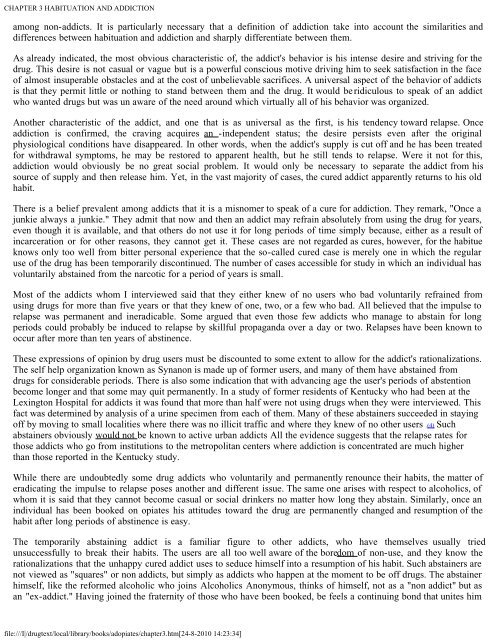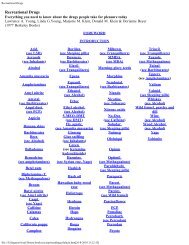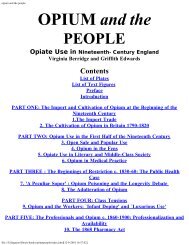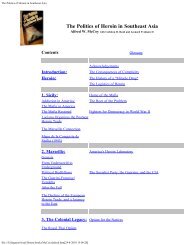Addiction and Opiates
Addiction and Opiates
Addiction and Opiates
Create successful ePaper yourself
Turn your PDF publications into a flip-book with our unique Google optimized e-Paper software.
CHAPTER 3 HABITUATION AND ADDICTION<br />
among non-addicts. It is particularly necessary that a definition of addiction take into account the similarities <strong>and</strong><br />
differences between habituation <strong>and</strong> addiction <strong>and</strong> sharply differentiate between them.<br />
As already indicated, the most obvious characteristic of, the addict's behavior is his intense desire <strong>and</strong> striving for the<br />
drug. This desire is not casual or vague but is a powerful conscious motive driving him to seek satisfaction in the face<br />
of almost insuperable obstacles <strong>and</strong> at the cost of unbelievable sacrifices. A universal aspect of the behavior of addicts<br />
is that they permit little or nothing to st<strong>and</strong> between them <strong>and</strong> the drug. It would be ridiculous to speak of an addict<br />
who wanted drugs but was un aware of the need around which virtually all of his behavior was organized.<br />
Another characteristic of the addict, <strong>and</strong> one that is as universal as the first, is his tendency toward relapse. Once<br />
addiction is confirmed, the craving acquires an -independent status; the desire persists even after the original<br />
physiological conditions have disappeared. In other words, when the addict's supply is cut off <strong>and</strong> he has been treated<br />
for withdrawal symptoms, he may be restored to apparent health, but he still tends to relapse. Were it not for this,<br />
addiction would obviously be no great social problem. It would only be necessary to separate the addict from his<br />
source of supply <strong>and</strong> then release him. Yet, in the vast majority of cases, the cured addict apparently returns to his old<br />
habit.<br />
There is a belief prevalent among addicts that it is a misnomer to speak of a cure for addiction. They remark, "Once a<br />
junkie always a junkie." They admit that now <strong>and</strong> then an addict may refrain absolutely from using the drug for years,<br />
even though it is available, <strong>and</strong> that others do not use it for long periods of time simply because, either as a result of<br />
incarceration or for other reasons, they cannot get it. These cases are not regarded as cures, however, for the habitue<br />
knows only too well from bitter personal experience that the so-called cured case is merely one in which the regular<br />
use of the drug has been temporarily discontinued. The number of cases accessible for study in which an individual has<br />
voluntarily abstained from the narcotic for a period of years is small.<br />
Most of the addicts whom I interviewed said that they either knew of no users who bad voluntarily refrained from<br />
using drugs for more than five years or that they knew of one, two, or a few who bad. All believed that the impulse to<br />
relapse was permanent <strong>and</strong> ineradicable. Some argued that even those few addicts who manage to abstain for long<br />
periods could probably be induced to relapse by skillful propag<strong>and</strong>a over a day or two. Relapses have been known to<br />
occur after more than ten years of abstinence.<br />
These expressions of opinion by drug users must be discounted to some extent to allow for the addict's rationalizations.<br />
The self help organization known as Synanon is made up of former users, <strong>and</strong> many of them have abstained from<br />
drugs for considerable periods. There is also some indication that with advancing age the user's periods of abstention<br />
become longer <strong>and</strong> that some may quit permanently. In a study of former residents of Kentucky who had been at the<br />
Lexington Hospital for addicts it was found that more than half were not using drugs when they were interviewed. This<br />
fact was determined by analysis of a urine specimen from each of them. Many of these abstainers succeeded in staying<br />
off by moving to small localities where there was no illicit traffic <strong>and</strong> where they knew of no other users .(4) Such<br />
abstainers obviously would not be known to active urban addicts All the evidence suggests that the relapse rates for<br />
those addicts who go from institutions to the metropolitan centers where addiction is concentrated are much higher<br />
than those reported in the Kentucky study.<br />
While there are undoubtedly some drug addicts who voluntarily <strong>and</strong> permanently renounce their habits, the matter of<br />
eradicating the impulse to relapse poses another <strong>and</strong> different issue. The same one arises with respect to alcoholics, of<br />
whom it is said that they cannot become casual or social drinkers no matter how long they abstain. Similarly, once an<br />
individual has been booked on opiates his attitudes toward the drug are permanently changed <strong>and</strong> resumption of the<br />
habit after long periods of abstinence is easy.<br />
The temporarily abstaining addict is a familiar figure to other addicts, who have themselves usually tried<br />
unsuccessfully to break their habits. The users are all too well aware of the boredom of non-use, <strong>and</strong> they know the<br />
rationalizations that the unhappy cured addict uses to seduce himself into a resumption of his habit. Such abstainers are<br />
not viewed as "squares" or non addicts, but simply as addicts who happen at the moment to be off drugs. The abstainer<br />
himself, like the reformed alcoholic who joins Alcoholics Anonymous, thinks of himself, not as a "non addict" but as<br />
an "ex-addict." Having joined the fraternity of those who have been booked, be feels a continuing bond that unites him<br />
file:///I|/drugtext/local/library/books/adopiates/chapter3.htm[24-8-2010 14:23:34]





